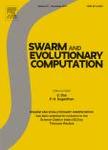版权所有:内蒙古大学图书馆 技术提供:维普资讯• 智图
内蒙古自治区呼和浩特市赛罕区大学西街235号 邮编: 010021

作者机构:Cent South Univ Sch Traff & Transportat Engn Changsha 410075 Peoples R China Cent South Univ Sch Automat Changsha 410075 Peoples R China Space Star Technol Co Ltd Beijing 100086 Peoples R China
出 版 物:《SWARM AND EVOLUTIONARY COMPUTATION》 (Swarm Evol. Comput.)
年 卷 期:2025年第93卷
核心收录:
学科分类:08[工学] 0812[工学-计算机科学与技术(可授工学、理学学位)]
基 金:National Natural Science Foundation of China
主 题:Earth observation satellite (EOS) Orbital maneuver Multi-objective optimization Improved NSGA-II Adaptive strategy
摘 要:Earth observation satellite (EOS) systems playa crucial role in performing emergency monitoring tasks such as natural disasters. In terms of urgent observation tasks within a limited period, manipulating the orbit EOSs to meet emergency requirements is an efficient scheme. The traditional multiple satellite orbit maneuver optimization problem (MSOMOP) almost considers single objective optimization, neglecting the optimization conflicting objectives in practical applications. This paper is devoted to conducting multi-objective optimization research for the MSOMOP. First, a multi-objective mathematical model is established, where the response time, imaging resolution, and fuel cost are considered as optimization objectives. Subsequently, an adaptive feedback learning of non-dominated sorting genetic algorithm-II (AFL-NSGA-II) is proposed, which introduces the idea of adaptive strategy and a feedback learning mechanism into the traditional NSGA-II. The AFL-NSGAII incorporates an increased learning mechanism and adaptive strategies, which facilitates efficient solution search and reduces the risk of converging to a local optimum. Moreover, several problem-specific designed operators are incorporated into the algorithm to enhance the search capability. Finally, we conduct extensive experimental studies to verify the efficiency of the proposed algorithm. Experiment results demonstrate that the proposed AFL-NSGA-II outperforms three existing algorithms and exhibits superior performance in typical scheduling scenarios.